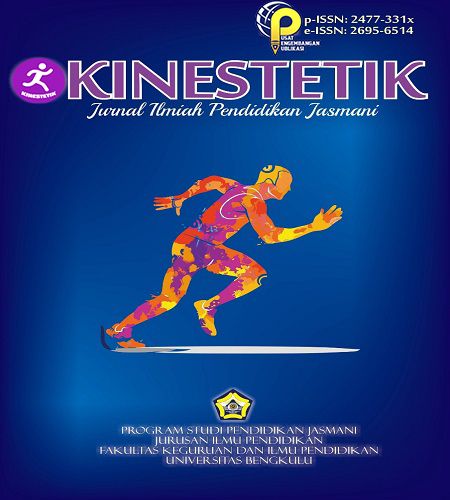Main Article Content
Abstract
Keywords
Article Details
- Authors retain copyright and grant the journal right of first publication with the work simultaneously licensed under a Creative Commons Attribution-ShareAlike 4.0 (CC BY-SA) that allows others to share the work with an acknowledgement of the work's authorship and initial publication in this journal.
- Authors are able to enter into separate, additional contractual arrangements for the non-exclusive distribution of the journal's published version of the work (e.g., post it to an institutional repository or publish it in a book), with an acknowledgement of its initial publication in this journal.
- Authors are permitted and encouraged to post their work online (e.g., in institutional repositories or on their website) prior to and during the submission process, as it can lead to productive exchanges, as well as earlier and greater citation of published work (See The Effect of Open Access).
- This work is licensed under a Creative Commons Attribution-ShareAlike 4.0 International License.
References
- Adams, D. L. (1999). Develop better motor skill progressions with gentile’s taxonomy of tasks. Journal of Physical Education, Recreation & Dance, 70(8), 35–38.
- Bruce Joyce, Marsha Weil and Emily Calhoun, Models of TEACHING _ Model-Model Pengajaran. Yogyakarta: Pustaka Pelajar. 2011.
- David L Gallahue and John C. Ozmun, Understanding Motor Development. ”Infant, Children, Adolescents, Adults.” Americas, New York: The McGraw-Hill Companies. 2006.
- David Sugden and Michael Wade. Typical amd Atypical Motor Development, London: Mac Keith Press. 2013.
- Defliyanto, D., Asmawi, M., Pelana, R., & Yarmani, Y. (2020). Development of Learning Model for Squat-style Long-jump Basic Technique Based on Biomechanics with a Game. PENDIPA Journal of Science Education, 4(1), 31-39.
- Gall, M. D., Borg, W. R., & Gall, J. (2003). P.(1996). Educational Research. An Introduction.
- HAPIDIN, H., & YENINA, Y. (2016). Pengembangan model permainan tradisional dalam membangun karakter anak usia dini. Jurnal Pendidikan Usia Dini, 10(2), 201-212.
- Jim Lavin, Creative Approaches to Physical Eduacation “Helping Children to Achieve Their True Potential”. London and NewYork: Routledge. 2008
- Kusuma, H. W., Asmawi, M., Hernawan, F. D., Dlis, F., & Kanca, I. N. (2020). Physical Activity Development. Model. Using Traditional Balinese Game in Junior High School. PENDIPA Journal of Science Education, 4(1), 40-46.
- Lloyd, M. (2016). Typical and Atypical Motor Development. In Adapted Physical Activity Quarterly (Vol. 30). https://doi.org/10.1123/apaq.30.4.387.
- Magill & Anderson. (2014). Motor Learning and Control, Consepts and Applications.
- Maksum, H. (2017). Pengembangan model pembelajaran gerak dasar lompat jauh dengan permainan. Jurnal Pendidikan Olahraga, 6(1), 42-53.
- Stephen Elder, Fundamental Motor Skill, A Manual for Classroom Teachers. Victoria: Community Information Service, 2009.
- Suharnoko, F., & Firmansyah, G. (2018). Pengembangan Model Pembelajaran Melompat Melalui Permainan Lompat Cermin Untuk Siswa Sekolah Dasar. Jurnal SPORTIF: Jurnal Penelitian Pembelajaran, 4(2), 145-158.
- V. Gregory Payne and Larry D. Isaacs. Human Motor Development, A Lifespan Approach. New York: Mc Graw Hill, 2012.
References
Adams, D. L. (1999). Develop better motor skill progressions with gentile’s taxonomy of tasks. Journal of Physical Education, Recreation & Dance, 70(8), 35–38.
Bruce Joyce, Marsha Weil and Emily Calhoun, Models of TEACHING _ Model-Model Pengajaran. Yogyakarta: Pustaka Pelajar. 2011.
David L Gallahue and John C. Ozmun, Understanding Motor Development. ”Infant, Children, Adolescents, Adults.” Americas, New York: The McGraw-Hill Companies. 2006.
David Sugden and Michael Wade. Typical amd Atypical Motor Development, London: Mac Keith Press. 2013.
Defliyanto, D., Asmawi, M., Pelana, R., & Yarmani, Y. (2020). Development of Learning Model for Squat-style Long-jump Basic Technique Based on Biomechanics with a Game. PENDIPA Journal of Science Education, 4(1), 31-39.
Gall, M. D., Borg, W. R., & Gall, J. (2003). P.(1996). Educational Research. An Introduction.
HAPIDIN, H., & YENINA, Y. (2016). Pengembangan model permainan tradisional dalam membangun karakter anak usia dini. Jurnal Pendidikan Usia Dini, 10(2), 201-212.
Jim Lavin, Creative Approaches to Physical Eduacation “Helping Children to Achieve Their True Potential”. London and NewYork: Routledge. 2008
Kusuma, H. W., Asmawi, M., Hernawan, F. D., Dlis, F., & Kanca, I. N. (2020). Physical Activity Development. Model. Using Traditional Balinese Game in Junior High School. PENDIPA Journal of Science Education, 4(1), 40-46.
Lloyd, M. (2016). Typical and Atypical Motor Development. In Adapted Physical Activity Quarterly (Vol. 30). https://doi.org/10.1123/apaq.30.4.387.
Magill & Anderson. (2014). Motor Learning and Control, Consepts and Applications.
Maksum, H. (2017). Pengembangan model pembelajaran gerak dasar lompat jauh dengan permainan. Jurnal Pendidikan Olahraga, 6(1), 42-53.
Stephen Elder, Fundamental Motor Skill, A Manual for Classroom Teachers. Victoria: Community Information Service, 2009.
Suharnoko, F., & Firmansyah, G. (2018). Pengembangan Model Pembelajaran Melompat Melalui Permainan Lompat Cermin Untuk Siswa Sekolah Dasar. Jurnal SPORTIF: Jurnal Penelitian Pembelajaran, 4(2), 145-158.
V. Gregory Payne and Larry D. Isaacs. Human Motor Development, A Lifespan Approach. New York: Mc Graw Hill, 2012.
